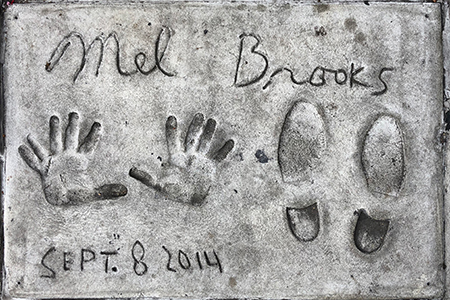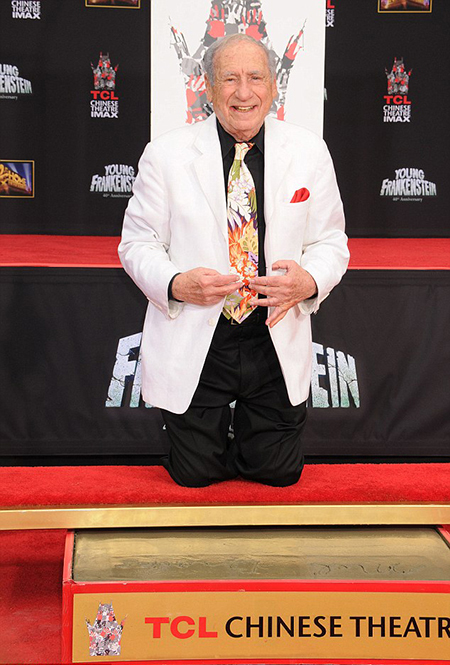 |
 |
|
|
| Mel Brooks |
 |
Forecourt Ceremony held on Monday, September 8, 2014
|
| |
Born: Melvin Kaminsky, June 28, 1926, in Brooklyn, New York
Age at the time of the ceremony: 88 |
| |
Mel Brooks is a comedy legend. The man has taken more risks with his material than any comic of his generation (which is saying quite a bit), and while these techniques are frequently imitated, they have never been duplicated.
Brooks has said a lot about his comedy, but one aspect of it is: "A lot of my comedy is based on anger and hostility." And this stems from the fact that his Polish/Jewish father died of kidney disease when he was two years old, leaving his Ukrainian/Jewish mother to raise Irving, Lenny, Bernie and Melvin in the tenaments of Williamsburg.
Small and sickly as a kid, Mel had a taxi-driving uncle Joe, who would drive Broadway people back to Brooklyn and get tickets in exchange. Uncle Joe took Mel to see Anything Goes with Ethel Merman sometime in 1935. He told his uncle that he wasn't going to go into the garment biz, he was going into showbiz.
At 14, Mel got a job as a sort of MC at the local swimming pool, where he did bits. Musically inclined, he learned the drums from Buddy Rich. While playing drums one night, a comic failed to show up, so Mel took the stage at age 16. After finishing high school, Mel (now Brooks) was drafted into the Army in 1944, undergoing Basic Training at Fort Sill, Oklahoma.
Brooks was a corporal in the 1104 Engineer Combat Battalion, 78th Infantry Division, which swept for land mines in advance of Allied advances through Germany. After Gemany's surrender, he helped organize shows for demobilizing troops.
Brooks went back to the Borscht Belt, where he played drums and piano and told jokes, but he realized that being behind the scenes was more to his taste. When his buddy Sid Caesar got a chance to do a show on television, he hired Brooks as a writer, who worked on (along with people like Neil Simon) 139 episodes of Your Show of Shows, aired over NBC from February 1950 to June 1954.
Meanwhile, he wrote sketches for the revue Leonard Stillman's New Faces of 1952 with Alice Ghostley, Eartha Kitt, Carol Lawrence and Paul Lynde in the cast, running for 365 performances, from May 1952 to May 1953. The show was filmed as a CinemaScope extravaganza called New Faces (released in February 1954).
When Imogene Coca left Your Show of Shows, Brooks was asked to work as a writer (along with Larry Gelbart, Carl Reiner and Neil Simon) for 13 episodes of Sid Caesar's next show, Caesar's Hour, aired over NBC from October 1954 to May 1957.
By that time, Shinbone Alley, a musical adaptation of the Archy and Mehitabel stores, with the book written by Brooks and Joe Darion opened on Broadway. In the cast was Eddie Bracken, Eartha Kitt and Ross Martin. It only ran 49 perfs, from April to May 1957.
Brooks and Carl Reiner made history with a recording of a routine they had performed at parties: The 2000 Year Old Man. Their first recording was released in 1960, with others released in 1961, 1962, 1973 and 1997. In 1998, Brooks and Reiner received Grammy Awards for these recordings.
Brooks wrote the book for the musical All American from the novel Professor Fodorski by Robert Lewis Taylor. The show was directed by Joshua Logan and starred Ray Bolger. It ran for 86 perfs, from March to May 1962.
In the short film The Critic (released in May 1963), Brooks made fun of "art house" films and it won the Oscar for Best Live Animated Short (well, Brooks is not tall). In 1964, Brooks married a second time to Anne Bancroft, to whom he was married until her death in 2005.
Continuing on his merry way, Brooks created (with Buck Henry) Get Smart, with Don Adams and Barbara Feldon, which ran for 138 episodes over CBS from September 1965 to May 1970. Brooks and Henry wrote the scripts for only three episodes: The pilot, "Mr. Big" aired in September 1965,
"Our Man in Leotards" aired in November 1965 and "Survival of the Fattest" aired in December 1965.
Brooks won a Primetime Emmy (along with Sam Denoff, Bill Persky, Carl Reiner and Mel Tolkin) for writing a television special, The Sid Caesar, Imogene Coca, Carl Reiner, Howard Morris Special, aired over CBS in April 1967.
Itching to make fun of Adolph Hitler, Brooks wrote a script for a musical called Springtime for Hitler, but no one would back the idea. A former bond salesman Sidney Glazier undertook to produce, and with Joseph E. Levine's money, Brooks suddenly found himself in the director's chair. The result, The Producers (released in November 1968) with Zero Mostel and Gene Wilder, hit the public sideways at first, but has since become a comic monument of tastelessness and hilarity. Brooks won an Oscar for Best Original Screenplay.
After that, Brooks wrote and directed The Twelve Chairs (released in October 1970) with Ron Moody and Frank Langella. Brooks did the voice for the "Blonde-Haired Cartoon Man" for all 780 episodes of The Electric Company, with Morgan Freeman, aired over PBS from October 1971 to April 1977.
Most famously, Brooks co-wrote and directed Blazing Saddles (which not only played the Chinese in February 1974, but some of it was shot there) with Cleavon Little and Gene Wilder. The wildly irreverent film became a huge money-maker for Warner Bros., who decided to pass on his next project with Gene Wilder, with whom he co-wrote and directed Young Frankenstein (released in December 1974) starring Gene Wilder and Peter Boyle. It became another money-gusher, this time for 20th Century Fox.
After this, Brooks was a creator (along with John Boni and Norman Stiles) of When Things Were Rotten with Dick Gautier as Robin Hood and Dick Van Patten as Friar Tuck, which aired over ABC for 13 episodes from September to December 1975.
Fox also allowed Brooks to star as director Mel Funn as well as co-write and direct Silent Movie (released in June 1976) with Marty Feldman, and after that, his parody of the films of Alfred Hitchcock, with Brooks starring in and co-writing, producing and directing High Anxiety (released in December 1977) with Madeline Kahn. Fox also let Brooks write, direct, produce and star in History of the World: Part I (released in June 1981) with Dom DeLuise.
In 1980, Brooks began Brooksfilms, with the intention of producing films on his own. His first production was The Elephant Man (released in October 1980) with Anthony Hopkins and John Hurt. Then, he had Richard Benjamin direct My Favorite Year (released in October 1982) with Peter O'Toole as a washed-up movie actor doing live television in the early 1950s. Great movie.
Brooks produced and starred in the Jack Benny role in a remake of Ernst Lubitsch's To Be or Not to Be (released in December 1983) with his wife Anne Bancroft. Then Brookfilms produced David Cronenberg's harrowing remake of The Fly (released in August 1986) with Jeff Goldblum and Geena Davis.
At MGM, Brooks co-wrote, directed, produced and starred in his parody of Star Wars called Spaceballs (released in June 1987) with John Candy. It became a substantial hit. Brooks followed this up by co-writing, directing, producing and starring in Life Stinks (released in July 1991) with Lesley Ann Warren. It flopped.
At Fox, Brooks co-wrote, directed and produced Robin Hood: Men in Tights (released in July 1993) with Cary Elwes, which was only a moderate success. His last real directing job was as co-writer, director, producer and star in Dracula: Dead and Loving It (released in December 1995) with Leslie Nielsen in the title role. It flopped.
Then, came another idea: he co-wrote the book, and wrote the music and lyrics for a musical version of The Producers with Nathan Lane and Matthew Broderick. The show ran for 2,502 perfs, from April 2001 to April 2007. Lane and Broderick left the show in 2002, allowing them to appear in the film version. The Producers won 12 Tony Awards, including Best Musical, Best Book of a Musical and Best Original Score. So now Brooks became one of the rare group who had won an Oscar, an Emmy, a Tony and a Grammy. The whole Broadway gang got together with Uma Thurman to make the film version of The Producers (musical) (released in December 2005).
Back on Broadway, Brooks co-wrote the book, and wrote the music and lyrics for Young Frankenstein with Roger Bart in the title role, for 485 perfs, from November 2007 to January 2009. During this run, a feature film of Get Smart (which played the Chinese in June 2008) with Steve Carell and Anne Hathaway opened. Brooks seems to have had no involvement with it, and it shows. It made money, however.
When Brooks was invited to make his impressions at the Chinese Theatre Forecourt to promote the Blu-Ray release of Young Frankenstein, Brooks became the only honoree to have six fingers on his left hand.
Brooks returned to Broadway for Mel Brooks on Broadway for two nights, June 17 and 18, 2019. During the Corona virus lockdown, Brooks wrote an autobiography, All About Me! My Remarkable Life in Show Business, published in December, 2021. He did the voice of The Shogun in Paws of Fury: The Legend of Hank (released in July 2022).
Brooks narrates and has contributed bits to the long-awaited (!) sequel History of the Wolrd Part II, in eight episodes over Hulu, beginning in March 2023. He was awarded an Honorary Oscar in January 2024. |
|
|
|
|
| |
 |
 |
| TCL Chinese Theatre IMAX®, Hollywood, California. Mel Brooks Forecourt block. Executed by unknown, Monday, September 8, 2014. 37 x 24 inches. |
 |
 |
 |
| TCL Chinese Theatre IMAX®, Hollywood, California. Mel Brooks Forecourt ceremony, Monday, September 8, 2014. Mel Brooks shows off the sixth finger of his left hand while making his imprints in the wet cement. |
|
|